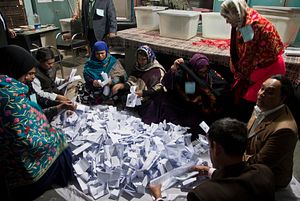General elections in Bangladesh may be at least two years away, but the country has begun taking steps toward the conduct of the vote. On February 27, a five-member Election Commission, led by former law secretary Kazi Habibul Awal, was sworn in for a five-year term. The process to appoint a new Election Commission was set in motion on February 5, when President Md Abdul Hamid set up a search committee to recommend names for the posts of chief election commissioner and four commission members.
Prior to setting up a search committee Hamid held a series of talks with political parties. However, almost all the major opposition parties, including the Bangladesh Nationalist Party (BNP), neither participated in the dialogue with the president nor suggested names for the Election Commission posts. They said they do not have confidence in the search committee. Soon after the Election Commission was formed, BNP secretary Mirza Fakhrul Islam Alamgir said that “the party has no interest in the newly announced election commission.”
The current controversy over the Election Commission is not new. It can be traced back to the 1990s. In 1996, the Awami League (AL) called for the general election to be held under a neutral caretaker government. The then-ruling BNP rejected the demand and the AL boycotted the elections held in February that year. The BNP government enacted legislation making constitutional provision for a neutral caretaker government that would conduct elections.
In 2006, the AL accused the head of the caretaker government of having close ties with the ruling BNP. Its boycott of the general election that year triggered unrest, paving the way for the military to stage a coup. In the December 2008 election, the AL and its allies came to power with an absolute majority.
Capitalizing on a Supreme Court verdict that the caretaker government provision is unconstitutional, the AL government in 2011 used its massive majority in parliament to scrap the system of holding elections under a neutral caretaker government. This prompted the BNP to boycott the 2014 general election. Consequently, 153 of 300 parliamentary constituencies went uncontested. AL candidates were thus elected without competition.
In 2018, another election was held under the AL government. This time the BNP participated in the election. However, there were widespread reports of vote-rigging. In its report on the election, Transparency International Bangladesh said that a range of electoral irregularities including stamping of ballot papers on the eve of the voting and stuffing of ballots by capturing booths on election day were witnessed in 47 out of 50 constituencies surveyed. The report also drew attention to the complicity of law enforces in these irregularities.
Two consecutive elections with a range of irregularities have caused a deadlock in Bangladesh’s political landscape. The formation of the Election Commission drew media attention as it will conduct the general election scheduled for December 2023.
The Election Commission will not be able to make a difference unless it is fully empowered to conduct elections fairly.
The problem is that Bangladesh in recent years has developed a one-party political culture. Experts are even describing it as a hybrid regime and a competitive authoritarian state. In the circumstances, the chances of the Election Commission being a truly neutral and non-partisan body appear bleak. The AL government will have to do more to bolster the confidence of the public and of political parties in institutions like the Election Commission.
































